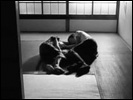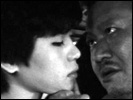 |
 |
|
Pink films and more
By Jasper Sharp
This month's Round-up is of a predominantly sexual orientation, including a handful of movies from Ryuichi Hiroki to tie in with our exclusive interview this month, several new pink titles released in the UK by Salvation under their Sacrament banner to tie in with the review of Takahisa Zeze's latest, A Gap in the Skin, and some racy titles from the 80s, probably unlikely to ever see the light of day in the West.
Angel Guts: Red Classroom
Bugging Mania - Friday Girl
Lolita Vibrator Torture
The Lost Virgin
Lunchbox
Midori
Raigyo - The Woman in Black Underwear
Tokyo X Erotica
White Rose Campus: And then Everyone Gets Raped
|
 |
Angel Guts: Red Classroom
Original Title: Tenshi no Harawata: Akai Kyoshitsu
Director: Chusei SONE
Cast: Yuki MIZUHARA, Keizo KANIE, Jun AKI, Minako MIZUSHIMA, Ryoichi KUSANAGI, Yoko KOJIMA
Running time: 79 mins.
Year: 1979
DVD: Artsmagic (USA)
 After the success of Angel Guts: High School Coed, Sone was back again helming the second Angel Guts movie, and in some respects the first in the series proper, as it is the first to introduce the main characters of Nami Tsuchiya and Tetsuro Muraki, here played by Mizuhara and Kanie respectively. Still in this episode Nami is kept just out of arm's reach, and it is through Muraki that the story is told. After the success of Angel Guts: High School Coed, Sone was back again helming the second Angel Guts movie, and in some respects the first in the series proper, as it is the first to introduce the main characters of Nami Tsuchiya and Tetsuro Muraki, here played by Mizuhara and Kanie respectively. Still in this episode Nami is kept just out of arm's reach, and it is through Muraki that the story is told.
Muraki is an editor of an men's only magazine who becomes bewitched with a mysterious woman he sees in a staged rape scene in an illicitly screened blue movie (the title, Red Classroom, refers to the location where the rape was filmed). The woman, of course, turns out to be called Nami, and intrigued by her cold impassive stare, Muraki tracks her down in order to get to know her more fully and find out what desperate circumstances led her to become involved in the movie, but he finds only pain and misery awaiting him.
One of the stated intentions of Ishii with his manga was to explore the ways men and women relate to one another, and especially men's expectations of women. The series' very title comes from the fact that angels are fantasy figures and not real humans, so do not have organs such as guts to link them to a physical existence (also it should be pointed out that the Japanese link their emotions to their hara, or stomachs, rather than their hearts, as Westerners do). Those that fall in love with only an image are not seeing the real person.
Red Classroom perhaps captures this element better than any of the other films, as Muraki falls prey to all manner of dangers while trying to reconcile the image of Nami seen in the movie with the reality. Nami remains an elusive femme fatale character throughout the film, with any attempts at getting close or understanding her proving futile. Interestingly the actress Mizuhara played in a not entirely dissimilar title role in Toei's softcore adaptation of Tanizaki's Naomi.
Sone's presence in the director's chair is especially interesting considering that this and its predecessor are the two most stylistically different consecutive episodes in the series. Rather than the somewhat crude, punkish energy of the first, Red Classroom adopts a more dreamlike and sedate narrative, putting us firmly in the shoes of its obsessive protagonist. The dramatic use of pounding rain, deep saturated reds and coloured lighting also turned into stylistic adornments that became more engrained within the look of the series (just out on DVD in the U.S. from Artsmagic).
The result is not only one of the best of Sone's career, but also of Nikkatsu's entire Roman Porno period. The only real distraction from the main thrust of the drama is the lengthy sex scene midway through that disrupts the pacing and looks like its real purpose is mainly to pad out the running time.
|
 |
Bugging Mania - Friday Girl
Original Title: Tocho Mania - Friday No Onna
Director: Ryuichi HIROKI
Cast: Miki HIGUCHI, Emi NITTA, Yumi IWAMOTO, Masahiko ITO
Running time: 62 mins.
Year: 1986
 A TV presenter makes regular performances visible from her bedroom window, and is delighted to find herself the subject of the home movies of a voyeuristic freak with a camcorder. A TV presenter makes regular performances visible from her bedroom window, and is delighted to find herself the subject of the home movies of a voyeuristic freak with a camcorder.
With the prowling subjective camera at the beginning of the film and the percussive bass heavy soundtrack, the shadow of Dario Argento looms heavily over this stylish erotic movie from Hiroki. The TV journalist heroine, first seen interviewing the victim of an elevator rape, also recalls Ishii's Angel Guts series. Despite a surrealistic beach dream sequence, there's nothing really new here, but results are technically slick, and Hiroki handles the requisite set pieces with a characteristic verve.
|
 |
Lolita Vibrator Torture
Original Title: Rorita Baibu Zeme
Alternative title: Himitsu No Hanazono
Director: Hisayasu SATO
Cast: Sayaka KIMURA, Kiyomi ITO, Yuko SUWANO
Running time: 63 mins.
Year: 1987
 A perverted social outcast lures young sailor-suited virgins to the back of his truck where he torments and murders them before disposing of their corpses in an acid bath. With one, however, he meets his match. A perverted social outcast lures young sailor-suited virgins to the back of his truck where he torments and murders them before disposing of their corpses in an acid bath. With one, however, he meets his match.
Doing for the vibrator what Tobe Hooper did for the chainsaw, this particularly disturbing portrayal of borderline-pubescent girls far more knowing than their adult male counterparts is arguably one of the most unpleasant Sadean sex fantasies ever to hit the big screen. Though it should be pointed out that the actresses are all of legal age, the title alone of one of Japanese cinema's most notorious works (produced by Kan Mukai's Shishi Pro but distributed across the nation's pink cinemas by Nikkatsu) is pretty much guaranteed to touch a raw nerve with most.
Without the sloppiness of some of the other exemplars of the ero guro extreme cinema of the era such as the Guinea Pig series or Guts of a Virgin however, what prevents the whole thing from becoming unbearable is Sato's canny mastery of technique. The bewildering surfeit of mediating devices between the viewer and the images - composites of black and white photos, pixelated close-ups of VHS screens, computer monitors, mirrored reflections - toy with the psychological mechanisms of the gaze to question the viewer's implication in this sicko technological fantasy, as well as voyeuristically probing into the anonymity of urban spaces. These visuals synthesize with the disconnected aural experimentations on the soundtrack of echoing screams, the shrill buzz of the titular instrument of torture and even the fortuitous side-effects of the post-synched sound due to the budgetary requirements of the pink film, to produce an outrageous and disorienting effect.
As if the Jackson Pollock of the porn world, Sato throws us into the midst of a psycho-sexual maelstrom that rages unfettered by any notions of propriety, good taste or even the basic demands of the softcore market. Realism is not the goal here. The whole work is staged as if a piece of extreme performance art: images of writhing semi-naked bodies defaced with spray paint, wide-eyed faces vomiting blood and milky white quicklime to the stroboscopic effect of a camera flash, all set against a backdrop adorned with close-up photographic images of the distorted faces of previous victims. It is Masumura's Blind Beast finely honed for the decade of excess, the likes of which we are likely never to see produced again on such a scale. Indefensible on any rational level, to be sure, but one can't deny the power of such a vision.
|
 |
The Lost Virgin
Original Title: Rosuto Baajin: Yamitsuki Enjo Kosai
Alternative titles: Cuffs / Handcuffs
Director: Toshiki SATO
Cast: Nikki SASAKI, Taishi MATSUNAGA, Chika SAITO, Asami SAKURA, Shingo MUKAI, Hirokazu TABATA
Running time: 71 mins.
Year: 2001
DVD: Salvation (UK)
 Spread over three time periods (Summer 10 Years Ago/Summer 5 Years Ago/This Summer), Lost Virgin tells the tale of good-time girl Chisato (Sasaki), hungry for new experiences yet ultimately in search of emotional fulfilment. Spread over three time periods (Summer 10 Years Ago/Summer 5 Years Ago/This Summer), Lost Virgin tells the tale of good-time girl Chisato (Sasaki), hungry for new experiences yet ultimately in search of emotional fulfilment.
Each scene begins with our perky heroine in the middle of a paid date arranged through a phone dating service. In the first she is still in school uniform, with her prospective partner slapping some handcuffs on her, telling her it is because "virgins go too wild the first time". Fortunately she manages to make her getaway from this ruffian, minus her shoes, and is rescued by classmate Takashi (Matsunaga), who takes her under his wing, removes her handcuffs, lends her his trainers and unceremoniously deflowers her in the dingy apartment where he lives apart from his parents. Coming back for more a few days later under the ruse of bringing back his shoes, Chisato bumps into Takashi's girlfriend, Hikari (Sakura). Hikari, a high school dropout from the same year as Chisato, recognises her and the two go out and get drunk together, returning later with Takashi to spend the night as his apartment.
Five years later, Chisato is now working as an Office Lady and cohabiting with a new boyfriend, but seems unable to give up tel-club dating. Egged on by her friend Mari (Saito), after a meeting for a session booth the two go on for a threesome in a love hotel with a man Mari has arranged to meet. A few days later a chance meeting with Hikari, who now is married to Takashi and with a young daughter, plunges Chisato into an emotional crisis.
Slight but sprightly, Lost Virgin takes all its best attributes from those of its lead actress, Nikki Sasaki, sister of Yumeka, here in her film debut. With her rasping, husky voice, her marvellous elastically expressive face and her wiry frame kitted out in baggy clothes one size too large, she simultaneously brings out the vulnerability and raw sensuality of her character, and is a joy to watch throughout.
Director Sato blends quirky comic sight gags with self-consciously exaggerated performances and a low-key charm, but here rather underplays the sex, with most scenes taking place in long-shot and under half-light. But like the work of Shinji Imaoka, who wrote the script for this one, the eroticism comes through by building an emotional rapport with its viewers,
by putting interesting characters in realistic, believable situations as opposed to a more leering approach of using the plot solely to prop up the action set-pieces. It is no wonder that both directors are among the most popular with female pink fans in Japan, and the chances are that if you liked Lunchbox, you'll also be won over by this title.
|
 |
Lunchbox
Original Title: Obento
Director: Shinji IMAOKA
Cast: Yumika HAYASHI, Mutsuo YOSHIOKA, Lemon HANAZAWA, Ryo KURIHARA, Kiyomi ITOH, Yohta KAWASE, Takeshi ITOH
Running time: 65 mins.
Year: 2004
DVD: Salvation (UK)
 Lunchbox tells the tale of a brief but tragic love affair between Aiko (Hayashi), a simple mute girl working at a bowling alley, and Yoshio, a postal worker (Yoshioka) she meets when she accidentally knocks him from his bicycle. After making love soon after this initial encounter, Aiko finds herself increasingly drawn to this spiky younger man. Unable to express herself verbally, she doles out affection by means of the lovingly created lunchboxes she delivers to his workplace. But when he decides to call it a day, Aiko finds it difficult to let go. Lunchbox tells the tale of a brief but tragic love affair between Aiko (Hayashi), a simple mute girl working at a bowling alley, and Yoshio, a postal worker (Yoshioka) she meets when she accidentally knocks him from his bicycle. After making love soon after this initial encounter, Aiko finds herself increasingly drawn to this spiky younger man. Unable to express herself verbally, she doles out affection by means of the lovingly created lunchboxes she delivers to his workplace. But when he decides to call it a day, Aiko finds it difficult to let go.
Around 100 so-called "pink films" are shot every year in Japan to be released into a network of specialist cinemas, making up a significant proportion of Japan's independent sector. In the face of increasing sexual explicitness now permitted by the censors in the ever-booming pornographic video market, the emphasis of these theatrical productions lies more in their characterisation and settings. Interesting here then is that, unusually, the sex scenes are the unsimulated "real thing", though none of this actually comes across onscreen. Though as a rule pink films are shot on 35mm, Lunchbox was shot on 16mm for aesthetic reasons, and also, in another break with industry conventions, using live sound, rather than post-synced moans and groans.
Otherwise Lunchbox can be considered a typical work for director Imaoka, former assistant to two giants of the sex film, Takahisa Zeze and Hisayasu Sato. Working in the genre since 1990, his understated depictions of intense emotional relationships between marginal characters, relationships that to outsiders might seem thoroughly strange, make him one of the favourite directors among female pink connoisseurs. The intensity of the love scenes and the tenderness of the performances make this work especially one of considerable potency, though the film can hardly be said to be particularly sexually explicit.
Look out for an appearance from Kiyomi Itoh, the young girl at the heart of Hisayasu Sato's Lolita Vibrator Torture.
|
 |
Midori
Original Title: Ryuichi HIROKI
Cast: Hiroko SHIMADA, Haruhiko KATO, Masato IRIE, Hiroko NAKASHIMA, Reona HIROTA, Tomorowo TAGUCHI, YOSUKE
Running time: 104 mins.
Year: 1996
Midori Yoshinari (Shimada, also seen in Zeze's teen horror Kokkuri) is the linchpin in this coming-of-age drama set amongst the heady high school world of peer rivalry and sexual awakening, an emotionally detached year three student who, her parents dead, lives with her brother and his overprotective wife. After being sent out of class due to a dizzy spell, in the school sanatorium she becomes acquainted with Shun (Kato), a boy in the class below. As the two begin feigning illness together on a regular basis, their uncomfortable flirtations soon blossom into a full sexual relationship. Meanwhile, Midori has been left a suicide message in the form of a videotape by a former classmate named Kobayashi (Yosuke) containing footage from a film in which he wished to take the starring role. Shot just before he died, it contains incriminating accusations against his parents and teachers.
Playing with the conventions of the well-established genre known as the seishun eiga, or youth movie, Hiroki ladles on liberal doses of sensuality intermingled with passages of dreamy surrealism to the depictions of Midori's turbulent day-to-day home and school life. Marking the beginning of Hiroki's focus on the young female protagonists fumbling through confused emotional worlds, much of the power of this portrait derives from the tension created by Midori's acceptance or rejection of her turbulent circumstances.
Financed by Fuji Television, the film received a Restricted rating due to its fairly liberal nudity, including a full frontal from its young actress.
|
 |
Raigyo - The Woman in Black Underwear
Original Title: Kuroi Shitagi No Onna Raigyo
Director: Takahisa ZEZE
Cast: Moe SAKURA, Takeshi ITOH, Takuji SUZUKI, Ryumei HOMURA, Sumiko NOGI, Bunmei TOBAYAMA, Kazuhiro SANO, Tomohiro OKADA, Mai KAWANA, Kazuya SASAKI, Yumi YOSHIYUKI, Yukiko IZUMI
Running time: 75 mins.
Year: 1997
DVD: Salvation (UK)
 Both at home and abroad, at the turn of the millennium Takahisa Zeze was most certainly the highest profile practitioner of the pink film, but despite claims from some quarters, his work is hardly representative of the field. It is fair to say that Zeze makes pink films like no other. In fact, due to its relative lack of flesh scenes and brooding, insidiously bleak mood, its distributors had problems getting this particular film into pink cinemas at all, though the results certainly did no harm to Zeze's standing among neither his peers nor genre aficionados. Both at home and abroad, at the turn of the millennium Takahisa Zeze was most certainly the highest profile practitioner of the pink film, but despite claims from some quarters, his work is hardly representative of the field. It is fair to say that Zeze makes pink films like no other. In fact, due to its relative lack of flesh scenes and brooding, insidiously bleak mood, its distributors had problems getting this particular film into pink cinemas at all, though the results certainly did no harm to Zeze's standing among neither his peers nor genre aficionados.
A lot of Zeze's work from this late-90s period, before his Anarchy in Japansuke and Tokyo X Erotica saw him in a more playful mood, took real-life crimes scoured from trashy tabloid magazines as their inspiration, including his similarly atmospheric snowbound erotic thriller Dirty Maria (Kegareta Maria: Haitoku No Hibi, 1998, like Raigyo also available on DVD from Salvation), and the later non-pink indie production of Hysteric (2000). As with Raigyo, he uses these cases, not so much to explore or explain the motivations of those involved, but as a starting point to create deliberately vague elliptical works with unique, highly-charged atmospheres.
Based on an event that occurred in March 1988, without giving too much away Raigyo depicts a meeting arranged by a tel-club sex service between a young woman, who has slipped out of hospital where she is being treated for a chronic pancreatic condition, and a complete stranger. The encounter ends with one of them brutally murdered in the shower of a deserted Love Hotel.
The title refers to a type of fish imported from Taiwan, the snakehead mullet, known for its peculiar flesh-eating habits during the spawning season and inedible flesh due to the parasites it carries. From its very opening shots, the motif of pollution is all-pervasive, with pink's most accomplished cinematographer, Koichi Saito, shooting the bleak, marshy landscapes of the industrial no-man's-land where the film is set in a jaundiced sepia tone, later turning to cold greenish greys, with the warm lighting of the hotel bedroom contrasting with the violent blood-red tiles of its bathroom.
A bleak portrayal of the dark side of human nature, Raigyo will disappoint those drawn to it for the sexual content, and its cold, detached air punctuated with moments of unflinching savagery will undoubtedly turn off casual viewers. Nevertheless, with its beautiful cinematography and haunting atmosphere, it ranks amongst both the director's and the genre's finest works.
Raigyo's cast and crew represent a real convocation of pink filmmaking talent. Zeze's AD on this, Rei Sakamoto, would later direct films such as 21st Century Girl, while the cast features not only another of the Four Devils, Kazuhiro Sano, but two women pink directors. Lead actress Sakura, while gaining continued exposure in the films of rival company OP Productions, later directed a number of pink films for the company Exces Film, including Ijimeru Jukujo-tachi Inran Chokyo [trans: Bullying mature women debauchery training, 2002], while one of pink's most celebrated female directors, Yumi Yoshiyuki, puts in a brief appearance as her nurse.
|
 |
Tokyo X Erotica
Original Title: Tokyo X Erotika Shibireru Kairaku
Director: Takahisa ZEZE
Cast: Yumeka SASAKI, Mayuko SASAKI, ERI, Mariko NAKA, Yuichi ISHIKAWA, Shiro SHIMOMOTO, Takeshi ITOH, Yohta KAWASE
Running time: 77 mins.
Year: 2001
DVD: Salvation (UK)
 Unlike former directors of the 80s such as Masayuki Suo or Yojiro Takita, Takahisa Zeze did not sever all roots with his pink filmmaking past after he'd used it as a springboard into more mainstream productions. Though he has become a lot less prolific in the field, he does occasionally dip back into pink in between more conventional indie productions such as Rush! and Dog Star. When he does, because of the high esteem in which he is held by production company Kokuei, he is granted a lot more leeway to experiment than many others who work in the genre, despite the unpopularity of his works with many among pink's core theatrical audiences. Unlike former directors of the 80s such as Masayuki Suo or Yojiro Takita, Takahisa Zeze did not sever all roots with his pink filmmaking past after he'd used it as a springboard into more mainstream productions. Though he has become a lot less prolific in the field, he does occasionally dip back into pink in between more conventional indie productions such as Rush! and Dog Star. When he does, because of the high esteem in which he is held by production company Kokuei, he is granted a lot more leeway to experiment than many others who work in the genre, despite the unpopularity of his works with many among pink's core theatrical audiences.
Tokyo X Erotica is historically significant for being the first pink film to be shot and projected digitally upon its initial run in pink cinemas, as opposed to using either 16mm or 35mm film. Unlike the bleak and moody atmospheres of a lot of his cryptic work from the late 90s, it is most closely-related to his previous, Anarchy in Japansuke (1999), in the kaleidoscope view it gives of modern society and how its members interact through sex.
Using the flexibility of shooting that DV provides, rather than construct a single, self-contained narrative, Tokyo X Erotica darts between a number of different intertwining characters and time periods. In 1997, with Kenji (Ishikawa), her former boyfriend whom she caught cheating on her, having been killed in the Aum gas attacks of 1995, Haruka (Yumeka Sasaki) has cheerlessly turned to prostitution and engages in various lewd acts with her oddball client, dressed in a rabbit suit, in a futuristic-looking love hotel. On the day of Kenji's death in 1995, a man (Itoh) pays a visit to the apartment of his married lover (Mayuko Sasaki) to indulge her rough, adulterous sex-play fantasies. Back in 1989, as the events of Tiananmen Square in Beijing unfold over the TV, two young couples (including Yohta Kawase, and Eri, one of the three girls in Tetsuaki Matsue's documentary Every Japanese Woman Makes Her Own Curry) indulge in an orgy of drink, drugs and partner-swapping. We return to Haruka's story, which concludes in a near future scenario in 2002 (the film was shot and released in 2001).
Breaking up the various scenes with to-the-camera interviews with the various cast members, all remaining in character, about such topics as society and the nature of life and death, Zeze again pushes the pink genre into new territory, though the sex scenes obviously takes up a large component of what unfolds on screen. Alternately lighting his scenes in lurid, fantastic colours or stripping them down to low-res monochrome, the film has an edgy, spontaneous, improvisational feel to it. It might be a stretch to draw comparisons with Jean-Luc Godard, but the influence is certainly apparent. Not entirely successful, but further proof of the wide-ranging artistic territory inhabited by the contemporary Japanese sex film and a key work in the career of its director.
|
 |
White Rose Campus: And then Everyone Gets Raped
Original Title: Shirobara Gakuen: Soshite Zenin Okasareta
Director: Koyu OHARA
Cast: Nami MISAKI, Ayako OTA, Mayo MIYAMOTO, Mika YAMAJI , Waka ODA, Yuichi MINATO
Running time: 70 mins.
Year: 1982
 While stopping off for a toilet break, a busload of 35 high school girls on a study trip and their comely teacher (Misaki) find their vehicle boarded by three armed thugs, who run rampage down the aisle, systematically denuding, deflowering and then discarding their victims onto the roadside where they are picked up and rescued by a sympathetic trucker following in pursuit of the fleeing bus. And that's really about all there is to it. While stopping off for a toilet break, a busload of 35 high school girls on a study trip and their comely teacher (Misaki) find their vehicle boarded by three armed thugs, who run rampage down the aisle, systematically denuding, deflowering and then discarding their victims onto the roadside where they are picked up and rescued by a sympathetic trucker following in pursuit of the fleeing bus. And that's really about all there is to it.
In their time the Nikkatsu Corporation doled out a good deal of intriguing and well-made movies in the service of their Roman Porno line, but this interminably sleazy piece of throwaway misogyny from the sporadically interesting journeyman director Ohara has to rank among the lower depths of their product, anticipating a rougher, harder strain of Japanese eroticism that would become more typical of pink and porno in the 80s.
From the very offset expectations are set suitably low. In an early scene before the orgy of depravity begins, we see one of the sadistic roughnecks sealing himself into a ladies toilet cubicle, rifling through the soiled tampon bucket and inserting the bloody swabs up his nose while attempting to bring himself to climax. Thereafter, for the most part the film follows a predictable course of nubile young girls sobbing and screaming "yada!" as they are stripped naked and brutalised by their assailants, growling and gurning with their victim's panties on their heads.
Aside from its truly horrible sequenced synth soundtrack that could only have come from the early 80s, as its full title might suggest, White Campus is just too ridiculously over-the-top to be truly offensive. Nevertheless, brevity is the film's only real virtue in the face of its complete lack of invention and surprise. All in all, certainly nothing worth dwelling upon for long. |